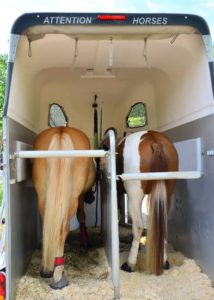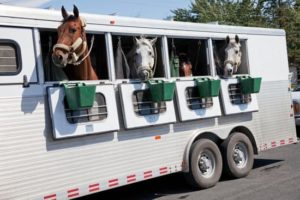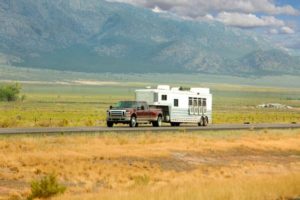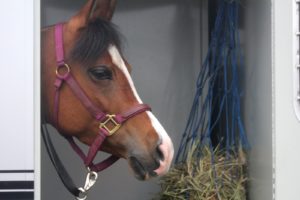Whether you are travelling south for the winter to escape the cold or for competitions, travelling long distance can be stressful for the horse. Careful management and dietary adjustments can ensure that your horse arrives in peak condition.

Horses are often transported far and wide around the country, some manage this with no issues while others struggle with stress, weight loss and fatigue.
Weight loss during transport is a common problem for horses and some can lose an average of 4.4 pounds of body weight per hour (Marlin, et al 2002). A large proportion of this is due to loss of water and therefore for transportation of over an hour adequate water must always be provided or provided at an adequate number of stops. Dehydration can not only increase the risk of impaction colic but can also lead to early fatigue and thus poor performance on arrival.
Providing soaked hay can be one way of incorporating a little more water during long trips which can be useful if your horse is fussy about drinking away from home. It also has the advantage of cutting down on dust particles within the confined space which can have an impact on respiratory health.
Water sources can have a difference in taste and smell due to the various amounts and types of dissolved solids it contains. This can reduce your horse’s overall water consumption when away from home. Adding a flavoring (such as pure apple juice) to your horse’s water prior to travel, and then repeating when away from home, allows your horse to become accustomed to a familiar taste that doesn’t change and helps to mask any difference in smell or taste. However always ensure that both flavored, and plain water is offered.
Another way to ensure your horse stays hydrated is to add salt into the diet, as salt stimulates the thirst mechanism and the need to drink. 1 tablespoon per 500 pounds of body weight per day is generally recommended as horses rarely consume enough from a salt block.
Whilst most weight loss can be attributed to water loss have you ever thought of the amount of energy horses use whilst being transported?
 Numerous studies on the subject, which included trailers and bigger horse boxes/floats, estimated that the amount of energy a horse uses during transport is in the region of an equivalent amount of walking. Therefore, 1 hours worth of travel could equal approximately 1 hour of extra walking. The implication of this is that transport is tiring for horses and thus expecting your horse to travel long distances and then compete is not ideal for performance.
Numerous studies on the subject, which included trailers and bigger horse boxes/floats, estimated that the amount of energy a horse uses during transport is in the region of an equivalent amount of walking. Therefore, 1 hours worth of travel could equal approximately 1 hour of extra walking. The implication of this is that transport is tiring for horses and thus expecting your horse to travel long distances and then compete is not ideal for performance.
So, does this effect the diet? In short yes, if the horse uses more energy than he is eating then weight loss is likely to be seen. Therefore, it’s worth factoring in how much extra energy the horse is going to need in order to cover his transport time.
Although every horse is different and fitter horses may use less energy, it’s thought that roughly one hours’ worth of walking would use in the region of 956 to 1,434kcal of energy for an average 1100-pound horse. Thus, if travelling is the equivalent of walking, then each hour of travel would use roughly 0.956 to 1.434 Mcal energy. This could be increased further if there is any thermal stress (extreme heat for example) involved. Some studies have revealed that travelling in a trailer uses more energy than travelling in a larger float/horsebox. However, using the energy ranges above as an estimate of what needs to be replaced, no matter the mode of transport, gives peace of mind that your horse is well covered.
As an example, if you travel for 4 hours prior to a show that’s around 3.8 to 5.7 Mcal of extra energy your horse may need to be provided with.
That is the equivalent of around:
7.2 pounds of extra good quality grass hay
5.8 pounds of good alfalfa
3.3 pounds of a concentrate feed (at an energy level of 1700mcal per lb)
5.4 pounds of a beet pulp
All changes to the diet should be done gradually but if you are simply providing more of a feed/hay that the horse already receives then you don’t have to make changes too far in advance and you can simply increase the amount.
If you are adding in an extra product that the horse doesn’t normally receive then do so ahead of time (at least 7-10 days) to allow the horse’s digestive system to adapt to the new changes without putting his digestive system at risk of any upsets. Should you be changing your horses feed on arrival, plan to take enough of his previous feed in order to make that change over slowly. Always ensure when packing for your trip that you calculate the amount of food your horse will need so that you don’t run short.
Should you travel out of state often, changing your food to a national brand has the added advantage of being available across the country. But be aware that feed manufactured in different mills can differ as ingredients, milling techniques and climate changes can alter the composition of a product, so speak with your manufacturer prior to selecting a feed so you know what to expect.
 Ideally no horse should go any longer than 4 hours, during transport or competition, without something to eat, as this can increase the risk of colic or gastric ulcers. Saliva is a fantastic gastric acid buffer; however, horses only produce saliva when they chew. Thus, keeping them eating/chewing will ensure your horse has an extra added level of protection. Simply providing extra hay ad lib, will allow your horse to keep his digestive system healthy as well as simulating natural grazing behaviours. When travelling, consider the use of Alfalfa which also has an acid buffering capacity and can further help in reducing the risk of gastric ulcers.
Ideally no horse should go any longer than 4 hours, during transport or competition, without something to eat, as this can increase the risk of colic or gastric ulcers. Saliva is a fantastic gastric acid buffer; however, horses only produce saliva when they chew. Thus, keeping them eating/chewing will ensure your horse has an extra added level of protection. Simply providing extra hay ad lib, will allow your horse to keep his digestive system healthy as well as simulating natural grazing behaviours. When travelling, consider the use of Alfalfa which also has an acid buffering capacity and can further help in reducing the risk of gastric ulcers.
Keeping in mind that travel is costly to your horse’s energy levels, and can place undue stress on the horse, adjusting his diet and management routine can go a long way to ensure that your horse arrives still with plenty of fuel in his tank, as well as maintaining his condition.
Marlin, D, Nankervis, K (2002) Equine Exercise Physiology p277.